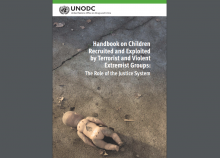
The United Nations Office on Drugs and Crime (UNODC) launched a new handbook on 26th January which seeks to provide coherent and consistent guidance to national authorities on the treatment of children recruited and exploited by terrorist and violent extremist groups, with emphasis on the role of the justice system. This handbook is the first United Nations publication on the topic.
On launching the publication, the UNODC's Director of the Division for Treaty Affairs, John Brandolino, said, “The world has been forced to face the reality that terrorists and violent extremist groups target children for their purposes”.
The rise of terrorist and violent extremists groups has proved particularly problematic for justice systems across the world, with the underlying concern at the core of this UNODC publication being how States can preserve public safety and, at the same time, effectively protect the rights of the child.
Prevention has become particularly complex, as evidenced by the innovative methods of propaganda and recruitment employed specifically by such groups. This jeopardises efforts to effectively tackle a security threat while, at the same time, limiting the victimisation of such children.
Furthermore, there is a reported lack of understanding regarding the rehabilitation and reintegration measures that can be effective in addressing the particular stigma associated with terrorism, while taking into account the extreme violence that has always characterised recruitment and exploitation of children.
The Handbook, which addresses policy-makers and practitioners dealing with children alike, seeks to tackle the issue on three fronts: by looking at methods to prevent the recruitment of children by terrorist and violent extremist groups; by identifying effective justice responses to children recruited and exploited by such groups, whether they are in contact with the justice system as victims, witnesses or alleged offenders; and by promoting the rehabilitation and reintegration of those children.
This publication ties into the wider work of the UNODC, who are providing technical assistance in the area of children and extremist groups at global, regional, and national levels.